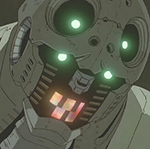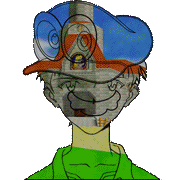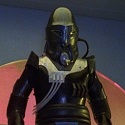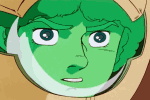|
jivjov posted:Apologies for the delay on the next review, the last few days have been filled with computer troubles moste severe, which has been sucking up all of my free time. Experiencing Classic American Movie Watching Habits
|
|
|
|

|
| # ? Apr 25, 2024 08:41 |
|
 The Castle of Cagliostro Released December 15th 1979, Directed by Hayao Miyazaki This is the one Miyazaki film I had seen previously, and it was certainly fun to revisit. First off, I know absolutely nothing about the Lupin III franchise, up to and including where exactly this movie is supposed to fit in to the mythos. As such, I experienced a bit of dissonance when Lupin meets up with characters who I assume are from the manga. Nobody goes completely unintroduced, but Goemon and Fujiko in particular are poorly served by this film. On the one hand, this film is part of a franchise, so certain knowledge can be expected to be brought in. ON the other hand, I'm sure plenty of people have done the same thing I have done and come into it context-less. Lupin himself is a so very predictable protagonist. He's got loads of gadgets, he's got an entire cadre of skilled friends, he's a master thief, he's comically bumbling but infinitely capable. He does the Sherlock thing of being able to deduce clues from a moment's observation of an item. This movie, at least, gives him no flaws (and honestly I don't think any of the main characters have any nuance to them) and that's frustrating. None of the other good guys really have anything to do other than show up and do their one gimmick to serve Lupin's scheme. Jigan shoots guns, Goemon does swords, Fujiko is independently playing her own scheme and helps distract the count. The plot itself is serviceable. I question why its a 100 minute movie, when I can see exactly where episode breaks would be placed to turn it into a plot arc of an ongoing series. But as a heist+kidnapping type plot, it works perfectly well. Honestly, the only things that really stick out to me about this are the beautiful landscapes and locales, and then the oddly gruesome defeat of the evil Count. (Over-the-top SPLORTCH sound effect included). I wish I had more to say about this film. It was not bad..but it was utterly rote and predictable. The only real intrigue is how the Interpol agent manages to get his job done despite being removed from the case. The action setpieces are amusing and dynamic, but there's no real sense of scale or stakes. I was entertained but not enthralled, and unlike Akira, I don't really have any desire to go check out other Lupin material. (But if anyone has some recommendations, I will take them under advisement) I don't even have anything to really say about Miyazaki himself here. I hoping that the trend of beautiful visuals continues, but other than DVD covers, I know nothing about upcoming Miyazaki stuff. Up Next: The Men Who Tread on the Tiger's Tail Produced August 1945; Released April 25th 1952, Directed by Akira Kurosawa.
|
|
|
|
I thought this Miyazaki film was garbage personally
|
|
|
|
Neowyrm posted:I thought this Miyazaki film was garbage personally Yeah, I'm not a fan myself. I actually liked the Lupid the Third show when I was younger (Whichever one aired on Adult Swim like a decade ago anyways at like five in the morning. Apparently there's actually been several different series.), but I think those stories are better suited to 22 minute romps- feature length just seemed bloated to me.
|
|
|
|
I was drawing a comparison to the Star Wars Clone Wars film; where it was overall one connected storyarc, but the 3 acts were so incredibly distinct that an OP and ED separating them out would not have felt amiss at all.
|
|
|
|
I've got less details about Miyazaki films (though someone gave me a book of his essays or maybe interviews with them that I really should get around to reading), but I can tell you a few interesting things about Cagliostro! Lupin III was the center of a huge international copyright case for decades. The original Arsene Lupin stories were still under copyright when the comics started in the 60's (also, they're really entertaining and worth reading) and at the time Japan was like China in terms of respecting copyright laws. As a result of the very lengthy litigation, Lupin material had a lot of trouble getting overseas distribution. Eventually they just ran out the clock, but before then people had to come up with some creative methods for avoiding getting sued. The makers of the video game Cliffhanger, for example, made a Dragon's Lair type game that took footage primarily from Castle of Cagliostro to make a game that consisted entirely of quick time events. They had to rename the main character "Cliff" to avoid problems. And when Streamline pictures released Lupin stuff including this movie, they called him "the Wolf".
|
|
|
|
They also just renamed him to Rupin or Rupan in a bunch of stuff, though I can't think of what specific things had that change.
|
|
|
|
 The Men Who Tread on the Tiger's Tail Produced August 1945; Released April 25th 1952, Directed by Akira Kurosawa. Well this was a fun little film to watch. The whole thing plays out over the course of something like 36 hours, and has a surprisingly comedic tone to it. From what I understand, this is a film adaption of a play, and it very much feels like it. There are a grand total of three locations; some forests, the border crossing checkpoint, and some grasslands. Of the characters that actually get a decent amount of attention, this film is incredibly well acted. The porter is a bit over the top, but he serves as a good foil to the more stoic members of Yoshitsune's party. Benkei is the obvious highlight; his performance convincing A complaint of mine, though, is that outside of the porter and Benkei, the rest of the travelling party is more or less completely inconsequential. Most of them barely get names, let alone any kind of character. For a movie with this short of a run time, the group should have been cut down to just 2 or 3 instead of 6 retainers. Also, the opening story cards were a disappointment. I'm getting early twinges of something that would go on to influence something like the opening crawl to Star Wars, but Tiger's Tail's backstory is presented in just such a dull manner. White text on black, no music. I can't tell if this was done out of a desire to save money on filming or just to maintain a focus on the core events depicted...but I get the feeling that I would have enjoyed this a lot better if Yoshitsune's backstory was done through at least in-character exposition rather than a plot dump. Notable scenes to me are the aforementioned scroll-reading (although this is more due to performance rather than cinematography), and then the very beginning of the film. The sequential horizontal wipes between each attempt by the porter to get to know his travelling companions do an excellent job of conveying a sense of time and distance traveled. Wipes like this are apparently the signature of Kurosawa's work, and I definitely am taking notice of them here. There are, of course, other wipes in the film, but none of them were as clear in their purpose than the ones right at the beginning. One other comment I have is on the reuse of actors. From what I've been told, I'm going to see many familiar faces throughout Kurosawa's filmography, and it started here with the return of Susumu Fujita. It was nice to see him again, as I really did enjoy the Sanshiro duology, but I hope it doesn't become too blatant or immersion-affecting as his filmography continues. And now for a sidebar on something completely different.  Those Who Make Tomorrow Released 1946, Directed by Akira Kurosaw, Hideo Sekigawa and Kajiro Yamamoto. I can't really say much about this one, but in the interest of completion here it is in my thread. As another propaganda piece, this seems the be a film that Kurosawa didn't really want anything to do with, has completely disowned, and had never gotten any kind of home media release. According to IMDB, Susumu Fujita stars in it though. Up Next: Nausicaš of the Valley of the Wind Released March 11th 1984, Directed by Hayao Miyazaki. jivjov fucked around with this message at 06:53 on Jan 8, 2016 |
|
|
|
jivjov posted:
I never found Kurosawa's reuse of actors to be distracting (because it's never done with a wink or to be a self reference thing). It's more interesting to watch a character go from a bad rear end Samurai to a pathetic loser between two films. I think it really shows to highlight the range of these great actors.
|
|
|
|
zandert33 posted:I never found Kurosawa's reuse of actors to be distracting (because it's never done with a wink or to be a self reference thing). It's more interesting to watch a character go from a bad rear end Samurai to a pathetic loser between two films. I think it really shows to highlight the range of these great actors. Cool; if its handled well and isn't used as a self-referential thing, I don't think I'll have much to worry about then.
|
|
|
|
jivjov posted:Cool; if its handled well and isn't used as a self-referential thing, I don't think I'll have much to worry about then. Yeah, like Drunken Angel is going to be the first time you encounter Toshiro Mifune, and each time you're going to be amazed by his depth and range, each character is so uniquely different from the others. One of the true geniuses of the form.
|
|
|
|
There are three eras of Kurosawa as far as I'm concerned: the pre-Mifune era, the Mifune era, and the post-Mifune era. That actor had such a big impact on Kurosawa's career, and they both did a lot of their best work together. They're just one of the great director/actor duos, like Scorsese/DeNiro, Rossellini/Bergman, Ford/Wayne, Hithcock/Stewart etc. Takashi Shimura was no slouch either, and he's going to start getting very good roles in Kurosawa films here soon.
|
|
|
|
Raxivace posted:There are three eras of Kurosawa as far as I'm concerned: the pre-Mifune era, the Mifune era, and the post-Mifune era. That actor had such a big impact on Kurosawa's career, and they both did a lot of their best work together. They're just one of the great director/actor duos, like Scorsese/DeNiro, Rossellini/Bergman, Ford/Wayne, Hithcock/Stewart etc. That's a good way to break it down. While I don't think Mifune was key to Kurosawa's genius, but they found each other at exactly the right moment in both of their careers to make an absolutely explosive mixture. I kind of liked The Men Who Tread on the Tiger's Tail, but I also felt that the pacing was way off. Like it was padded to about three times the length it should have been. Interacting with other characters or a few more tense incidents would have rounded out the film. I made a big deal about the film being shot in August 1945 (really late July through the end of August, IIRC) earlier since the creation of this film spanned two governments. They stopped shooting for a few hours to go to an office on the Toho lot to hear the Emperor's radio address where he announced the surrender and then had to go back to work. A week or two later the US sent observers to the set to examine the state of the Japanese film industry. They were shooting the checkpoint sequence at the time and literally looking over Kurosawa's shoulder was John Ford. It wasn't until almost a decade later that Kurosawa discovered that his idol had been standing right next to him and he didn't even talk to him.
|
|
|
|
Random Stranger posted:I kind of liked The Men Who Tread on the Tiger's Tail, but I also felt that the pacing was way off. Like it was padded to about three times the length it should have been. Interacting with other characters or a few more tense incidents would have rounded out the film. Yeah, this is pretty much exactly how I felt about everything. This could have been a 25 minute short film and communicated exactly the same story and information. That's honestly what has me a bit trepidatious about getting to some of the 2-3 hour films, although Kurosawa will have had more time to refine his craft by then.
|
|
|
|
The one thing that Kurosawa stumbles a little with is pacing and padding out films a little, but he gets to be so damned great that you forgive him for it.
|
|
|
|
jivjov posted:Yeah, this is pretty much exactly how I felt about everything. This could have been a 25 minute short film and communicated exactly the same story and information. That's honestly what has me a bit trepidatious about getting to some of the 2-3 hour films, although Kurosawa will have had more time to refine his craft by then. The only one of his superlong films that I feel was a bad experience (as opposed to an "I didn't care for this" experience) was The Idiot. And the studio chopped over an hour of the movie on him with that one so it may be a situation where the original, over four hour cut (it was going to be two movies) is a better film.
|
|
|
|
Random Stranger posted:The only one of his superlong films that I feel was a bad experience (as opposed to an "I didn't care for this" experience) was The Idiot. And the studio chopped over an hour of the movie on him with that one so it may be a situation where the original, over four hour cut (it was going to be two movies) is a better film. When I first saw The Idiot I didn't know it had been cut up, and I was really confused once title cards came on-screen and explained plot elements.
|
|
|
|
Nausicaš coming soon, I promise! Two of my housemates want to watch along with this one, and getting everyone together at the same time for a movie is proving difficult.
|
|
|
|
jivjov posted:Nausicaš coming soon, I promise! Two of my housemates want to watch along with this one, and getting everyone together at the same time for a movie is proving difficult. Watch more Kurosawa while you wait.
|
|
|
|
TrixRabbi posted:Watch more Kurosawa while you wait. This is a Good Idea and I'll do just that if we don't get Miyazaki done tonight.
|
|
|
|
 Nausicaš of the Valley of the Wind Released March 11th 1984, Directed by Hayao Miyazaki. The first "original" Miyazaki (based off his own manga, not a preexisting franchise), and it...is...BEAUTIFUL. And also a bit weird. I have a bunch of weird comparisons in my notes, to things like Evangelion, Akira, Max Max, and Final Fantasy. This was certainly a very interesting film. First off, I watched it with the English dub (the uncut 2005 one), mostly out of convenience, but just bear that in mind in case anything significant is different or was lost in translation. First off, I don't know if I'm just too genre savvy or what...but as soon as Obaba started telling a story about a prophesied hero wearing blue, I knew they were talking about Nausicaš. Maybe this was a more drawn out thing in the manga...but at least in the film adaptation, it wasn't a secret at all. I enjoyed the setup of the state of the world quite a bit. While I struggled a bit with names of both kingdoms/countries and people...the three main human factions were clear and distinct, although I wish the Pejites or the Tolmekians had gotten a bit more in the way of redeeming qualities. While they weren't one-dimensional as villains, the soldiers of both sides felt a bit too evil as opposed to self-serving (This might have been a deliberate post-apocalypse trope though). The Pejites at least had a substantial civilian populations...but they were just as blindly "good" and loyal to Nausicaš. As for the "alien" menace, I really like the story behind the Ohm and the toxic jungle. I couldn't tell you exactly where I've seen it before...but I've always been fond of the post-apocalypse concept of the 'cure' being just as damning for the remnants of humanity as the original war was. The themes of environmentalism and anti-WMD-ism actually hold up really well in today's political and environmental atmosphere. I was laughing a bit too hard though...my highest supervisor at work has the surname Ohm...and I couldn't get the image of an insectoid bossman out of my head. The "Great Warriors" is where my comparisons to Akira and Evangelion come from. The flashback sequences to the seven days of fire felt very very Eva to me, and then the half-grown Warrior embryo falling apart as it tried to attack reminded quite a bit of the gross flesh blobs in Akira. The overall visual style of this film was amazing. Going back to the 'clear and distinct' thing, the enemy combatants from both the enemy kingdoms had a unique flair to them. The civilians all had very similar hoods and headdresses though. The look and feel of the tech is one that I've not seen often...it wasn't "the stuff we know, except dusty" that shows up in a lot of post-apocalyptic media, nor was it the full brass-n-gears Steampunk either. Especially the stuff used by the people of the Valley had a very organic feel to it. Nausicaš's glider looks more like a gull than a machine, their breath masks were vaguely canine, their homes and windmills were built into the flow of the landscape, unlike Pejite's massive walled city. This organic feel gets spelled out a liiiitle too heavy-handedly in a late conversation between some men of the valley and the leader of the Tolmekians. Something about how they only used the bare minimum of fire to kill threatening spores, rather than burning whole forests, and how they did not want to undo in a day with fire what takes wind and water hundreds of years to grow. If anything, the end being a bit too heavy handed is one of the only major complaints I want to level against this film. The other is how the character of Yupa seemed to not serve much purpose beyond being a sort of Gandalf/Allanon type character to dispense some exposition and then have one and a half badass fights. I almost think that (Patrick Stewart's voicework notwithstanding) I would have rather gotten a bit more Asbel and a bit less Yupa. A minor complaint is that Nausicaš's prophesied powers don't get quite enough explanation. She seems to have some low level psychic ability with humans, a huge amount of empathy with Ohm, and then some kind of berserker rage. I almost would have preferred her to just have been the clever and empathetic girl that deduced the symbiotic relationship of the forest and the Ohm and the Jungle and used her empathy to save the day, rather than occasionally having what appears to be supernatural gifts...but that is by no means a deal breaker. Finally, I just want to highlight some of my favorite visuals. All the flashback stuff, with the Warriors and the Ohm destroying human civilization is tragically beautiful. The bit where Asbel shoves Nausicaš and her glider out into the clouds, and then her flight among the stormclouds, is wonderfully animated. And then everything with the wave of Ohm overtaking the entire landmass the valley is on, while suffering a bit from the 'on-the-nose' quality I mentioned before, is very imposing and bleak. Overall, I would highly recommend Nausicaš, and it again is another one of those films where I wouldn't mind finding out a bit more about the world; I may check out the manga for this one too. Up Next: No Regrets for Our Youth Released October 29th 1946, Directed by Akira Kurosawa.
|
|
|
|
I haven't seen that film, but from what I understand Hideaki Anno was more or less one of Miyazaki's apprentices. I guess it isn't too surprising that his works would have similarities to Miyazaki's.
|
|
|
|
Nausicaš was actually Hideaki Anno's first major work. Supposedly, when Ghibli (well, what was to become Ghibli eventually) fell behind schedule and started looking for more animators, he stormed straight into Miyazaki's office and handed him his portfolio. After looking through the entire portfolio, Miyazaki hired Anno on the spot and assigned him the God Warrior scenes. So the similarities to NGE are definitely not coincidental. Anno and Miyazaki also remained close friends over the years. Anno voiced the main character in Miyazaki's final film, The Wind Rises, and last year, there was a rumour that Anno could possibly direct a sequel to Nausicaš. I don't know of any direct connections to Akira, but given that it came out only four years after Naucisaš, I wouldn't be surprised if there were some influences. As for Nausicaš's psychic abilities, the manga never really explains them in-depth either, but I actually think it works better this way. Large parts of the film operate on a symbolic level, and in that sense, her abilities aren't so much unique special powers, as they are simply extensions of her natural empathy. It's not that she's the only one who can converse with insects, just that she's the only one willing to listen. Also, definitely check out the manga if you liked the world and characters. It's quite long and very different from the film in some respects, but if you enjoyed one, you're likely to enjoy the other.
|
|
|
|
Samuel Clemens posted:Nausicaš was actually Hideaki Anno's first major work. Supposedly, when Ghibli (well, what was to become Ghibli eventually) fell behind schedule and started looking for more animators, he stormed straight into Miyazaki's office and handed him his portfolio. After looking through the entire portfolio, Miyazaki hired Anno on the spot and assigned him the God Warrior scenes. So the similarities to NGE are definitely not coincidental. Anno and Miyazaki also remained close friends over the years. Anno voiced the main character in Miyazaki's final film, The Wind Rises, and last year, there was a rumour that Anno could possibly direct a sequel to Nausicaš. I don't know of any direct connections to Akira, but given that it came out only four years after Naucisaš, I wouldn't be surprised if there were some influences. Yeah, reading the manga is worth it just for Kushana alone.
|
|
|
|
 No Regrets for Our Youth Released October 29th 1946, Directed by Akira Kurosawa. More movies about war! But oh how very, very different this one is from The Most Beautiful or the propaganda-y pieces of Sugata Sanshiro Part II. No Regrets for Our Youth instead comes down on the anti-war side of the spectrum. But unlike The Most Beautiful in particular, this film doesn't beat you over the head with its political message. The first twenty minutes or so are a bit heavy handed, but once the school demonstrations and riots end the movie establishes a better focus on Yukie's journey from being an near-oblivious professor's daughter to the wife of a man arrested for treason against the country. On that note, those first 20 minutes feel a bit disjointed as compared to the rest of the film. The montages of demonstrations, intercut with newspaper headlines, combined with Noge's constant anti-fascism and academic freedom speeches play more over the top than the Yukie-focused sections. After the time skip to 1938, things flow a bit better. We really get introduced to the 'love triangle' between Yukie, Noge, and Itokawa. Although I get the distinct impression that she never really had any feelings for Itokawa and that anything between the two of them reflected the gender and family politics of the time; that she would simply be expected to get married to someone of the level of importance as Itokawa. However, I also got the impression that her feelings for Noge don't actually advance anywhere beyond school crush until after the next time skip. She's simply of marrying age and needs to be finding a husband soon. Something I took as contrary to traditional gender/family roles, however, was Professor Yagihara's near-unconditional support of Yukie moving out to Tokyo. I respect the character a whole lot more when he reveals that he really is a progressive sort. After that move (and the aforementioned timeskip up to 1941), we really get to start exploring Yukie's character. Turns out she's been bouncing from job to job, unable to find anything that she can truly devote herself to. She's reunited with both Itokawa and Noge, and forges a relationship with Noge, eventually marrying him. Here is another small misstep of the film, in my opinion. Yukie's desire to find something to devote herself to almost evaporates. Or, rather, she is content with devoting herself to Noge who is in turn devoted to a subversive anti-war effort. He steadfastly refuses to tell her exactly what he's up to; all she knows is "anti-war" and "illegal". So she becomes a doting housewife. This is in keeping with gender roles of the time...but watching this movie in 2015, I'm a bit disappointed. Thankfully, Yukie very much redeems herself later on. After Noge's arrest, Yukie herself is brought in for questioning, but of course can't reveal anything, so she in turn gets to rot in a cell. Professor Yagihara makes another appearance to try to defend Noge in court...but he's died in his cell. The movie isn't explicit about this...but I definitely got the impression that his sudden demise was not an act of chance, but rather someone accelerating the justice process. This is where the movie would have ended if it had been Noge's story; a spy tale of trying to save a country from its own decisions resulting in an agent's death. But instead we launch into a really interesting third act. Yukie goes to Noge's parents to plead their son's case to them. They're bitter that their son's actions have made them complete pariahs; forced to work their rice paddies overnight to avoid the jeers and scorn of others in the village. She works herself to the point of fever to convince Noge's family that their son was a good man...but the townsfolk never come around, at least not during the scope of this film. A bit of more realistic consequences inserted into what could have easily been turned into a trite 'happily ever after' ending. But, at the end of the day, Yagihara gets to return to being a professor, and Yukie continues to work with Noge's family, declaring herself a shining light of a rural cultural movement. Something interesting I noticed over the course of this film was the continual use of silence as a motif. Itokawa's silence during Noge's impassioned monologues, Yukie's silence while being questioned about Noge's activities, and Noge's father's mute status after his son's action's come to life. This lends a contemplative and pensive air to the film; appropriate for a post-war piece. This is reflected by a title card near the end of the movie, declaring that Japan lost the war, but freedom was restored. This is very much the product of a culture that was glad to be out of a destructive war. The return of Sanshiro alumni Susumu Fujita, Akitake Kōno, Kokuten Kōdō and Denjirō Ōkōchi did not detract from the experience for me at all. As I was told; part of the fun is seeing these familiar faces showing up in new roles, and there's not a wink or a nod to be found about it. In fact, I had to look up two of those names to even recognize that they had been in the Sanshiro films. I find it hard to explicitly quantify exactly what it is I really enjoyed about this film...but enjoy it I did. It's nice to have a war-related piece from Kurosawa that isn't a halfhearted propaganda piece, and the continuation of the plot past Noge's death is an interesting take that I haven't seen much in cinema before. Overall, a good solid recommend for No Regrets for Our Youth. Up Next: Castle in the Sky Released August 2nd 1986, Directed by Hayao Miyazaki. Apologies for the week-long delay in getting this one done. Hopefully Castle won't take me as long! Also, no thoughts from Neowyrm on this one...he was otherwise occupied while I was watching this one. jivjov fucked around with this message at 06:56 on Jan 8, 2016 |
|
|
|
I know this is probably true of every manga adaptation but holy poo poo, if you liked Nausicaš and enjoy Miyazaki as a storyteller at all, read the book. As with Akira this is only about 1/3 of a much bigger story (the movie came out 2 years into a 12-year manga run) but in this case it's a goddamn epic, with tons of worldbuilding, crazy battles and beautiful art.
|
|
|
|
|
I watched No Regrets for Our Youth about four months ago and I remember effectively nothing about it. It's a very slight movie with nothing besides the fact that it's by Kurosawa to recommend it.
|
|
|
|
Random Stranger posted:I watched No Regrets for Our Youth about four months ago and I remember effectively nothing about it. It's a very slight movie with nothing besides the fact that it's by Kurosawa to recommend it. I'm in a similar position- I watched it about a year ago myself, and the only things I can remember are "Huh, kind of neat to see Setsuko Hara in a Kurosawa film I guess" and that the film got more dull once Hara starts farming.
|
|
|
|
Sorry for the double post but I just watched Ran for the first time and holy poo poo. That movie is loving great. Dat masterful usage of color. Dat staging of action. Dat exploration of how violence reverberates across generations. It's a while off but you're in for a real treat when you get to this one, jivjov.
|
|
|
|
Just got a criterion collection copy of Ikiru for 50Ę at a local Japanese culture festival...when I get around to that one, I'll be able to review some bonus feature and the like
|
|
|
|
jivjov posted:Just got a criterion collection copy of Ikiru for 50Ę at a local Japanese culture festival...when I get around to that one, I'll be able to review some bonus feature and the like Ikiru is astounding, but it's really amazing when you watch Ikiru and Seven Samurai back to back and all these characters from Ikiru show up in 16th century Japan...
|
|
|
|
Don't worry, I am not dead. Current plan is to watch Castle in the Sky tomorrow evening.
|
|
|
|
jivjov posted:Don't worry, I am not dead. Current plan is to watch Castle in the Sky tomorrow evening. He actually is dead. Don't believe jivjov's lies. I--jivjov's handsomest roommate--can confirm.
|
|
|
|
RIP jivjov. I didn't really know you too well, but you watched some movies I guess.
|
|
|
|
Neowyrm posted:He actually is dead. Don't believe jivjov's lies. I--jivjov's handsomest roommate--can confirm. He is actually alive. Don't believe Neowyrm's lies. I--jivjov's second-most beautiful roommate--can confirm. The first most beautiful is Hayakawa Ken.
|
|
|
|
Krysmphoenix posted:The first most beautiful is Hayakawa Ken. 
|
|
|
|
 Castle in the Sky Released August 2nd 1986, Directed by Hayao Miyazaki. Ooof. What to say here... First of all, let me apologize again for the delay. The forums were down on the original day I was going to watch this, and I didn't want to not have a place to post when I had finished, so I delayed a day...and then I had a hell of a time actually getting invested in this film. I'm probably going to have an unpopular opinion here...but here we go. First, the good: This is a beautiful work. Skies, clouds, and storms are all gorgeous (and in places, very reminiscent of Nausicaš). I love the design of the airships, and especially the little dragonfly-esque pirate fliers. The soundtrack is haunting, and I adore the electronic bits. The robots on Laputa also have an interesting design, with the long and spindly arms, blinky lights to communicate, etc. But now the bad...This film draaaaaaaaaaaaaaaaaaagged on something fierce. This did not need a two hour runtime, and probably could have come in under 85 minutes easy. All the beginning stuff with Pazu and the miners and the townsfolk was ultimately pointless. Uncle Pom in the cave could have gotten his point across a lot quicker, the army was ultimately ineffectual and could have been eliminated in favor of just having Muska and his agents. And then Sheeta herself was just a mashup of Nausicaš and Clarisse from the last two Miyazaki films. Mysterious heritage, royal heirloom macguffin, castle of birthright with hidden abilities...it just all felt so stale, and its been over a month since I've seen those previous films. Had I seen this one first..maybe I'd feel more charitable toward it, but as it is, it just feels like a rehash. Nausicaš's message of a moderate and controlled use of technology is muddled in this presentation; the technology of Laputa is given no redeeming qualities other than the one robot putting flowers on a grave. Otherwise its all death and destruction. I don't even really have anything else to say here...this wasn't precisely a bad film, but to me, it was dull as dishwater. Up Next: One Wonderful Sunday Released June 25th 1947, Directed by Akira Kurosawa. jivjov fucked around with this message at 23:28 on Oct 12, 2015 |
|
|
|
 Atlantis: The Lost Empire Released June 3rd 2001, Directed by Gary Trousdale and Kirk Wise Ahhhh, Atlantis: Castle under the Sea. Laputa Done Better. This is how you do a "discovery of an ancient, technologically advanced civilization film. The main character, Milo, has an arc. He's bookish and introverted, and never succeeds when he attempts to stand up for himself. His threats to quit his university position of Cartography and Linguistics (and Boiler Maintenance) expert are met with scoffs from authority. And over the courses of the film he learns to spit in the eye of those scoffs. The villains of the piece are actually present and relevant throughout the whole story; being the expedition commander and his 2nd, as opposed to just being a bland Agent Smith that goes full-tilt-evil at the end. One of the only favorable comparisons I will make is that Mama Dola is very similar (in plot importance and overall tone) to the Ulysses crew; roguish, but ultimately good natured. But even the crew of the Ulysses gets more to do than the pirate gang. The journey to and through Atlantis gives most of the crewmembers a focus scene. Some are short; like Vinny and Mole each overcoming an obstacle on the path between the crash site and Atlantis proper. Others recur through the whole film; Dr. Sweet is a medic, caring for the crew, Nimoy's King Kashekim, and even getting to pull out Chekhov's bonesaw to help rescue a kidnapped Princess Kida. Speaking of; Kida actually gets to do something in this movie. While she does spend a bit of time being captured like Sheeta, Kida does a lot more proactive stuff, rather than just running away from everyone like Sheeta does. She's part of the scouting party that first meets the Ulysses crew, she 'recruits' Milo to help translate old Atlantean text, and she uses the Heart of Atlantis to activate the ancient stone-like robots that sacrifice the outskirts of the city to protect the core. (I'm starting to really see why there were accusations of plagiarism). The cool technology is also a lot more dynamic in this film compared to Castle in the Sky, what with the undulating baracuda fliers, and the sweeping shots of the Ulysses, but that may just be due to the 15 years of animation improvements between the two. But ultimately...one of the major things that sets Atlantis head and shoulders above Castle is its brevity. At a brisk 95 minutes, Atlantis traces the same basic plot beats, without lingering overlong on characters that end up being completely pointless to the narrative. A strong, strong recommend for Atlantis: The Lost Empire, and my unending bafflement as to why Kida never shows up in the roster of Disney Princesses. Up Next: One Wonderful Sunday Released June 25th 1947, Directed by Akira Kurosawa. jivjov fucked around with this message at 23:18 on Mar 27, 2016 |
|
|
|
jivjov posted:Atlantis: The Lost Empire Released June 3rd 1986 I think you've made an error.
|
|
|
|

|
| # ? Apr 25, 2024 08:41 |
|
Schwarzwald posted:I think you've made an error. WHOOPS, changed the date and not the year! All better. Nice catch.
|
|
|





















